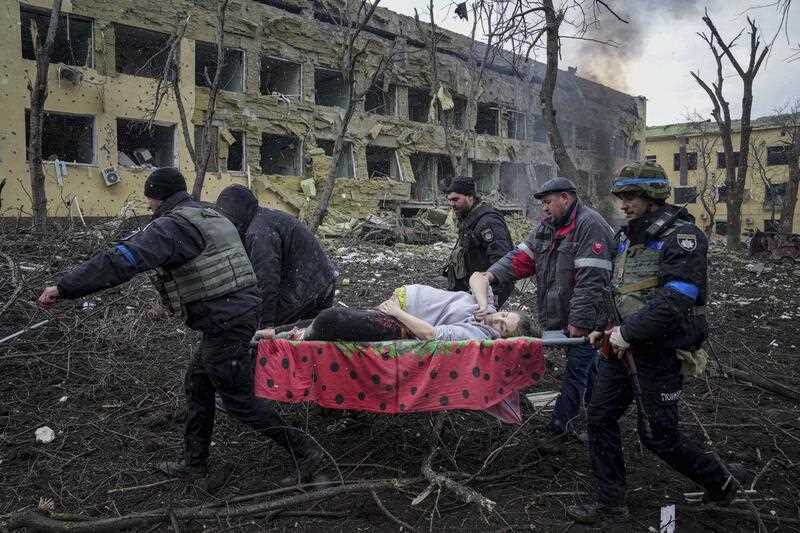A Russian air strike has badly damaged a children’s hospital in the besieged Ukranian port city of Mariupol, burying patients under rubble and injuring women in labour, Ukraine says.
Wednesday’s bombing, which Ukrainian President Volodymyr Zelenskiy called an “atrocity”, took place despite an agreed ceasefire to enable thousands of civilians trapped in the city to escape.
The city council said the children’s hospital had been hit several times by an air strike, causing “colossal” destruction.
“Direct strike of Russian troops at the maternity hospital. People, children are under the wreckage,” Zelenskiy said on Twitter.
Kremlin spokesman Dmitry Peskov said: “Russian forces do not fire on civilian targets.”
Ukraine’s foreign ministry posted footage of what it said was the hospital, showing blasted-out windows and piles of smouldering rubble.
The Donetsk region’s governor said 17 people were wounded, including women in labour.
Ukrainian Foreign Minister Dmytro Kuleba said Russia had broken the ceasefire around the southern port, which lies between Russian-backed separatist areas of eastern Ukraine and Crimea, annexed by Moscow from Ukraine in 2014.
“Russia continues holding hostage over 400,000 people in Mariupol, blocks humanitarian aid and evacuation. Indiscriminate shelling continues,” he wrote on Twitter.
“Almost 3000 newborn babies lack medicine and food.”
Ukraine said 67 children across the country had been killed since the invasion and at least 1170 civilians had died in Mariupol.
Russia’s defence ministry blamed Ukraine for the evacuation’s failure.
A senior US defence official said there were indications Russia’s military was not using precision-guided bombs.
Local officials said some civilians had left several Ukranian cities through safe corridors, including out of Sumy in the east and Enerhodar in the south, but that Russian forces were preventing buses evacuating civilians from Bucha, a town outside the capital Kyiv.
The International Committee of the Red Cross said: “Families are huddled underground for hours on end to seek refuge from fighting. Hundreds of thousands of people have no food, no water, no heat, no electricity and no medical care.”
More than two million people have fled Ukraine since Russian President Vladimir Putin launched the invasion on February 24. Moscow calls its action a “special military operation” to disarm its neighbour and dislodge leaders it calls “neo-Nazis”.
Kyiv and its Western allies say Russia is inventing pretexts to justify an unprovoked war against a democratic country.
Russian forces hold territory along Ukraine’s northeast border, the east and the southeast. Fighting has taken place in the outskirts of Kyiv, while Kharkiv is under bombardment.
A Russian assault force is stalled north of Kyiv and Western countries say the Kremlin has had to adjust its plan to swiftly topple the government in the face of fierce resistance.
Kuleba was due to meet Russian foreign minister Sergei Lavrov in Turkey on Thursday, but said: “Frankly … my expectations of the talks are low.”
Moscow says its demands, including that Kyiv takes a neutral position and drops aspirations of joining NATO, must be met for it to end its assault.
Ukrainian authorities are concerned for safety at Chernobyl, the mothballed site of the world’s worst nuclear disaster in 1986, where they said a power cut caused by fighting meant spent nuclear fuel could not be cooled. Russia blames Ukraine for the power cut.
Kuleba said reserve diesel generators had a 48-hour capacity. After that, cooling systems for the spent nuclear fuel would stop, “making radiation leaks imminent”.
The International Atomic Energy Agency said the heat from the spent fuel and the volume of cooling water were such that it was “sufficient for effective heat removal without need for electrical supply”.
The war has brought Russia economic isolation as governments and institutions imposed heavy sanctions and businesses shut operations. The World Bank says Moscow is edging close to defaulting on its debt.
Putin’s government took more measures to shore up the economy and said it would respond to a US ban on its oil and energy exports as the rouble dropped to record lows.
Get all the latest Canberra news, sport, entertainment, lifestyle, competitions and more delivered straight to your inbox with the Canberra Daily Daily Newsletter. Sign up here.



